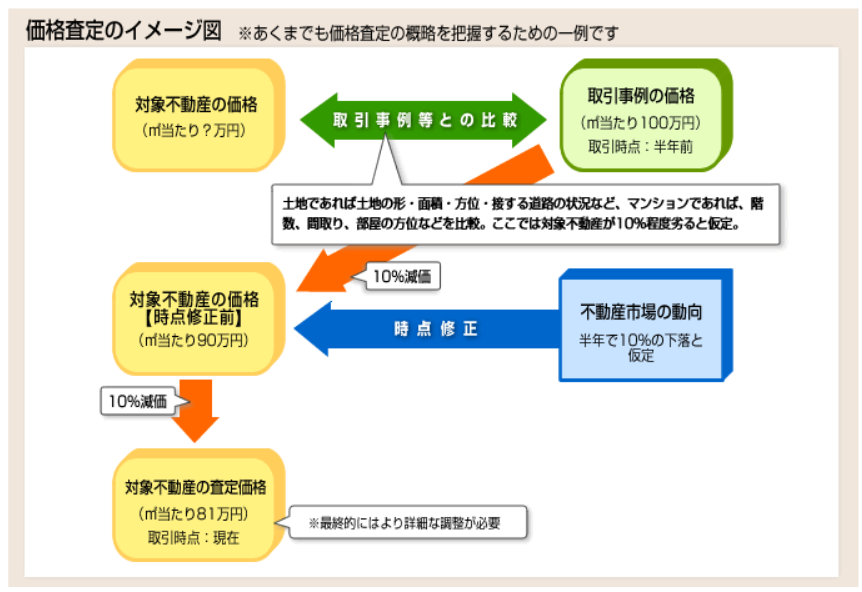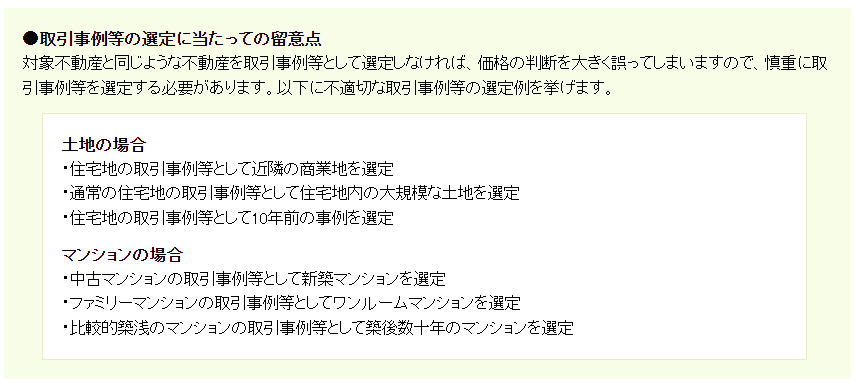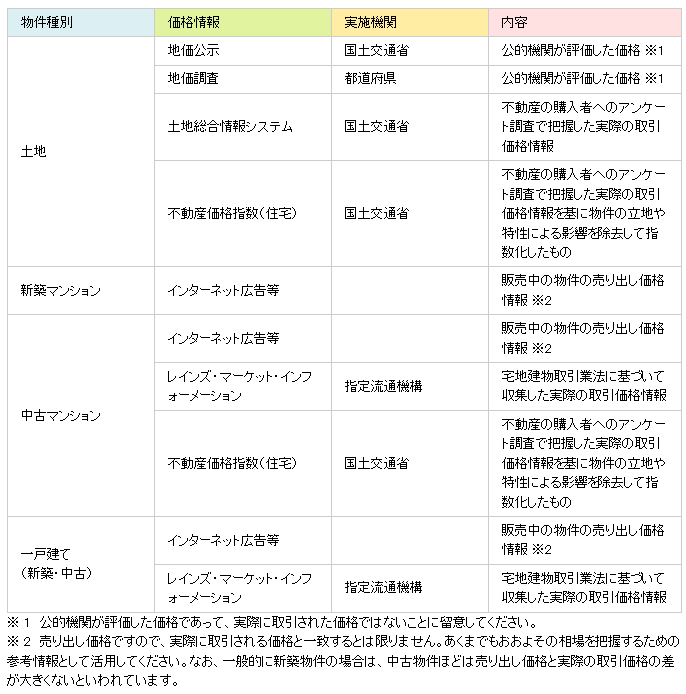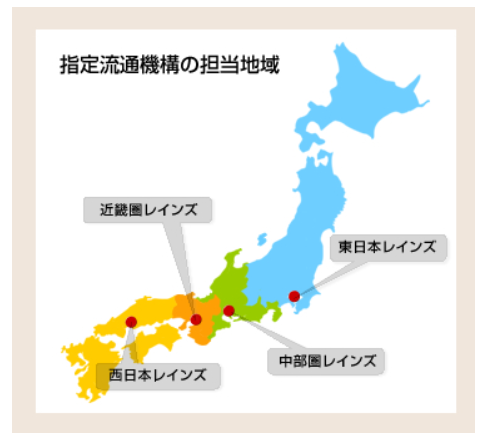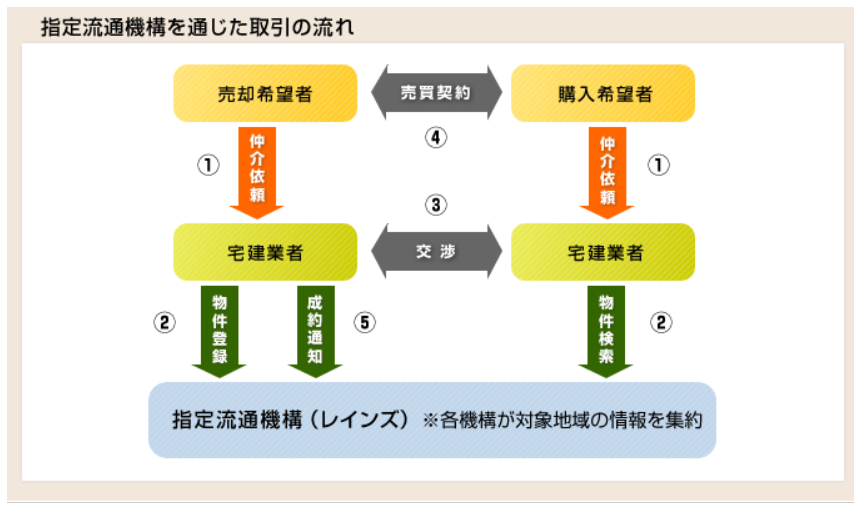2-1 Housing Prices
When buying a house, the price is one of the major determining factors. Since real estate is an asset that is highly individualized, it is extremely difficult to know whether the price being offered for sale is reasonable. In particular, with agency properties, the final sales price is determined through negotiations between the seller and the buyer. It is helpful to understand the following points regarding housing prices and evaluation method
Point 1: Understanding housing prices
- No two properties are the same
- The timing of transaction changes prices
- Subject to the final agreement of the seller and buyer
* Since real estate prices are determined for each individual transaction, it is not possible to completely verify such prices with objective data alone. It is important to (1) gather as much information as possible (including advice from experts) and fully examine the price and (2) negotiate in good faith with the other party to the final transaction to ensure that you are satisfied with your own decision.
Point 2: Understanding evaluation methods
A price assessment of real estate for the purpose of buying and selling is generally called a "price appraisal. There are various methods for price appraisal. The chart below shows the general structure of price appraisal for residential land (land) and condominiums with reference to the "Manual for Price Valuation" issued by the Real Estate Information Center. Please note, however, that a price assessment requires specialized consideration for each individual property.
The transaction comparison method (a basic method for assessing land and condominium prices)
Land and condominiums are often assessed by the transaction comparison method, which is a method of assessing the price of subject real estate by comparing it with the price of transaction cases of similar real estate.
First, the subject property is compared with properties that serve as transaction examples, and the approximate price range of the subject property is assessed based on the prices of transaction examples. Then, certain adjustments are made for differences in transaction timing, taking into account trends in the overall market (this is generally referred to as "point-in-time correction").
Land and condominiums are often assessed by the transaction comparison method, which is a method of assessing the price of subject real estate by comparing it with the price of transaction cases of similar real estate.
First, the subject property is compared with properties that serve as transaction examples, and the approximate price range of the subject property is assessed based on the prices of transaction examples. Then, certain adjustments are made for differences in transaction timing, taking into account trends in the overall market (this is generally referred to as "point-in-time correction").
Price Assessment
Compare the prices
The price of the subject property ( ? yen/㎡) ⇔ The price of a transaction example (1,000,000yen/㎡)
If the subject property is land, we compare the shape, area, orientation, and condition of the roads it abuts, etc. If it is an apartment, we compare the floor level, layout, and orientation of the rooms. Here, we assume that the subject property is about 10% less in price.
⇩ 10% depreciation
Point-in-time correction
Point-in-time correction
The price of the subject property (before point-in-time correction) (900,000yen/㎡)
⇐ Trends in the real estate market (assuming a 10% decline in six months)
⇐ Trends in the real estate market (assuming a 10% decline in six months)
⇩ 10% depreciation
The appraised price of the subject property
(810,000yen/㎡)
Time of transaction: Current
*More detailed final adjustments are needed.
The appraised price of the subject property
(810,000yen/㎡)
Time of transaction: Current
*More detailed final adjustments are needed.
(1) Comparison with other transaction cases
Compare the individual characteristics of the subject property with those of other transaction cases. (For instance, if it is land, the shape, area, orientation, and condition of the road that it touches, etc. are compared and if it is an apartment building, the number of floors, layout, and orientation of the rooms, etc., are compared.)
For each item, the value of the property used as a transaction case for comparison is adjusted based on whether the subject property is better or worse, and the approximate value of the subject property is appraised. (For instance, if the subject property is deemed to be 10% inferior to the transaction example, the value of the transaction example is depreciated by 10%.)
For each item, the value of the property used as a transaction case for comparison is adjusted based on whether the subject property is better or worse, and the approximate value of the subject property is appraised. (For instance, if the subject property is deemed to be 10% inferior to the transaction example, the value of the transaction example is depreciated by 10%.)
Points to keep in mind when selecting transaction examples
If real estate similar to the subject property is not selected as a transaction example, the value will be greatly miscalculated, and therefore, transaction examples should be selected carefully. The following are examples of improperly selected transaction examples.
In the case of land
- Selecting commercial land in a neighborhood as a transaction example for a property in a residential area
- Selecting a large plot of land in a residential area as a transaction example for an ordinary transaction in a residential area.
- Selecting a transaction of 10 years ago as a transaction example for residential land
In the case of condominiums
- Selecting new condominiums as examples of existing (previously owned) condominium transactions
- Selecting studio condominiums as examples of family condominium transactions
- Selecting condominiums that are several decades old as examples of relatively new condominium transactions
(2) Point-in-time correction
Compare the market trends at the transaction points of the subject property and the real estate that serves as a transaction example. The price is adjusted according to whether the market price has risen or fallen from the point in time when the property was traded. (For example, if it is determined that the market price has declined by 10% from the point in time when the property was traded, the price calculated based on the comparison with the transaction example is further depreciated by 10%.)
Compare the market trends at the transaction points of the subject property and the real estate that serves as a transaction example. The price is adjusted according to whether the market price has risen or fallen from the point in time when the property was traded. (For example, if it is determined that the market price has declined by 10% from the point in time when the property was traded, the price calculated based on the comparison with the transaction example is further depreciated by 10%.)
(3) Other points to consider
The appraisal of the value of the subject property cannot be completed only by comparing it with transaction examples and making a point-in-time correction. It is necessary to take other factors into account make to determine the final assessed value. In assessing a price, it is also important to consult with experts such as a real estate company.
The appraisal of the value of the subject property cannot be completed only by comparing it with transaction examples and making a point-in-time correction. It is necessary to take other factors into account make to determine the final assessed value. In assessing a price, it is also important to consult with experts such as a real estate company.
2-2 Buying a House: Market Prices
Research real estate pricing and market information.
Before consulting a real estate agent, try to gather information on your own first. It is important to have a certain price image. However, be careful not to have an overly preconceived image, as this image may be incorrect. Once you have a general image, consult with a real estate company about specifics.
Before consulting a real estate agent, try to gather information on your own first. It is important to have a certain price image. However, be careful not to have an overly preconceived image, as this image may be incorrect. Once you have a general image, consult with a real estate company about specifics.
Point 1: Find out about pricing information for a specific location.
Transaction examples and other price information that can be used as a reference for knowing the price of real estate that is to be bought or sold ("subject property") are not easily obtained. The table below shows individual price information that is relatively easy to obtain for each property type.
Property Type
1. Land
Pricing Information
Pricing Information
- Official land prices (published by the Ministry of Land, Infrastructure, Transport and Tourism): Prices assessed by public institutions*1
- Survey of land prices (published by prefectural governments): Prices assessed by public institutions*1
- Integrated land information system (published by the Ministry of Land, Infrastructure, Transport and Tourism): Actual transaction price information obtained through surveys of real estate buyers
- Real estate price index (residential) (published by the Ministry of Land, Infrastructure, Transport and Tourism): Indexes based on actual transaction price information obtained through surveys of real estate buyers, eliminating the effects of the property's location and characteristics
2. New condominium
Pricing Information
Pricing Information
- Internet advertising, etc.: Listing prices of properties for sale*2
3. Used condominium
Pricing Information
Pricing Information
- Internet advertising, etc.: Listing prices of properties for sale*2
- Reins market information (published by an authorized distributor): Actual transaction price information collected in accordance with the Real Estate Brokerage Act
- Real estate price index (residential) (published by the Ministry of Land, Infrastructure, Transport and Tourism): Indexes based on actual transaction price information obtained through surveys of real estate buyers, eliminating the effects of the property's location and characteristics
4. Single-family homes (new and used)
Pricing Information
Pricing Information
- Internet advertising, etc.: Listing prices of properties for sale*2
- REINS market information (published by an authorized distributor): Actual transaction price information collected in accordance with the Real Estate Brokerage Act
*1 Please note that these are the prices assessed by public institutions and not the prices at which the properties were actually traded.
*2 Since these are selling prices, they may not necessarily be the same as the prices actually traded. Please use them only as reference information to grasp the approximate market prices. In general, it is said that the difference between the asking price and the actual transaction price is not as large for newly constructed properties as for existing properties.
*2 Since these are selling prices, they may not necessarily be the same as the prices actually traded. Please use them only as reference information to grasp the approximate market prices. In general, it is said that the difference between the asking price and the actual transaction price is not as large for newly constructed properties as for existing properties.
How to look up price information for a specific location
- Check the transaction prices of a specific location that have been publicly announced.
- Check the selling prices of properties for sale by narrowing down the address, train line, or station in Internet advertisements, etc.
Point 2: Find out about market trends in your region.
Information on average market prices and trends such as price increases and decreases in each area is relatively easy to obtain. By examining this information, it is possible to grasp the approximate price range and fluctuation of each area, which can be used when considering the details of the preferred property (target area, price range, etc.) and budget. This information can also be used to correct the price information of a specific point in the past to the current price according to the rise or fall of the market (point in time correction).
You can examine published market trend information by type of land, new condominium, used condominium, and single-family home. It is also effective to ask for overall market information from a real estate agency that is well-informed of the area.
You can examine published market trend information by type of land, new condominium, used condominium, and single-family home. It is also effective to ask for overall market information from a real estate agency that is well-informed of the area.
How to research market trends in each region
Check the market trends such as average prices, average area, and number of properties in each area.
Check the market trends such as average prices, average area, and number of properties in each area.
Point 3: Why it is important to know the market price
If you are aware of the market prices, you can determine whether you need to revise your purchase plans and preferred conditions. For example, if you find that the market prices in your desired area are higher than your budget, you can review your preferred conditions by widening the area you are looking in or by looking for used houses as well as new houses. You can also get some idea of whether the property you are considering is relatively expensive, market-rate, or inexpensive. Ultimately, it is the buyer himself/herself who decides the purchase price. In order to make a wise decision, it is very important to have a grasp of the surrounding market prices.
📖Market Prices: the Real Estate Information Network System (REINS)
The Real Estate Information Network System: REINS
(1) Overview
The Real Estate Information Network System (REINS) is a real estate information distribution organization designated by the Minister of Land, Infrastructure, Transport and Tourism based on the Building Lots and Buildings Transaction Business Law, and is commonly referred to as "REINS." Currently, four entities (East Japan, Chubu area, Kinki area, and West Japan) have been established throughout Japan, each of which is responsible for the exchange of real estate information in their respective areas. More than 100,000 transactions are concluded each year through the exchange of information provided by REINS.
The Real Estate Information Network System (REINS) is a real estate information distribution organization designated by the Minister of Land, Infrastructure, Transport and Tourism based on the Building Lots and Buildings Transaction Business Law, and is commonly referred to as "REINS." Currently, four entities (East Japan, Chubu area, Kinki area, and West Japan) have been established throughout Japan, each of which is responsible for the exchange of real estate information in their respective areas. More than 100,000 transactions are concluded each year through the exchange of information provided by REINS.
Areas covered by four entities of REINS
East Japan, Chubu area, Kinki area, and West Japan
East Japan, Chubu area, Kinki area, and West Japan
(2) Primary Functions
Note that the real estate information of the designated distribution system is exchanged on the premise of the "duty of confidentiality" legally imposed on licensed real estate companies, and is therefore not available to the general public.
In particular, it has become common practice to conduct price assessments on pre-owned properties with reference to actual transaction prices ("contract prices") in the neighborhood to determine selling prices, etc. By consolidating contract information, REINS providing an environment for real estate companies brokering the deals to conduct price assessments appropriately and works to ensure the transparency of the real estate distribution market.
*RMI is an abbreviation for REINS Market Information.
(2) Primary Functions
Note that the real estate information of the designated distribution system is exchanged on the premise of the "duty of confidentiality" legally imposed on licensed real estate companies, and is therefore not available to the general public.
In particular, it has become common practice to conduct price assessments on pre-owned properties with reference to actual transaction prices ("contract prices") in the neighborhood to determine selling prices, etc. By consolidating contract information, REINS providing an environment for real estate companies brokering the deals to conduct price assessments appropriately and works to ensure the transparency of the real estate distribution market.
*RMI is an abbreviation for REINS Market Information.
- Exchange of real estate information
Note that the real estate information of the designated distribution system is exchanged on the premise of the "duty of confidentiality" legally imposed on licensed real estate companies, and is therefore not available to the general public.
- Consolidation of contract information
In particular, it has become common practice to conduct price assessments on pre-owned properties with reference to actual transaction prices ("contract prices") in the neighborhood to determine selling prices, etc. By consolidating contract information, REINS providing an environment for real estate companies brokering the deals to conduct price assessments appropriately and works to ensure the transparency of the real estate distribution market.
- Distribution of information on real estate transactions
*RMI is an abbreviation for REINS Market Information.
(2) Primary Functions
- Exchange of real estate information
Note that the real estate information of the designated distribution system is exchanged on the premise of the "duty of confidentiality" legally imposed on licensed real estate companies, and is therefore not available to the general public.
- Consolidation of contract information
In particular, it has become common practice to conduct price assessments on pre-owned properties with reference to actual transaction prices ("contract prices") in the neighborhood to determine selling prices, etc. By consolidating contract information, REINS providing an environment for real estate companies brokering the deals to conduct price assessments appropriately and works to ensure the transparency of the real estate distribution market.
- Distribution of information on real estate transactions
*RMI is an abbreviation for REINS Market Information.
Transaction flow through the designated distribution system
Prospective seller⇔
④ Sales ContractProspective buyer
⇩① Brokerage request⇩① Brokerage request
Real estate agent⇔
③ NegotiationReal estate agent
⇩② Register the property⇩⑤ Notify the signing of the contract⇩② Search for properties
REINS (the Real Estate Information Network System)
*Each regional entity of REINS consolidates information on their areas.
Prospective seller⇔
④ Sales ContractProspective buyer
⇩① Brokerage request⇩① Brokerage request
Real estate agent⇔
③ NegotiationReal estate agent
⇩② Register the property⇩⑤ Notify the signing of the contract⇩② Search for properties
REINS (the Real Estate Information Network System)
*Each regional entity of REINS consolidates information on their areas.


